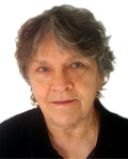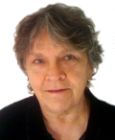
Personal Perspectives
When Nothing Works 4: the beginning of true mending
What arrives when we stop...
Posted March 14, 2010
I still can't believe I survived the winter of 2008. I lived in a tiny one-room cabin on a little mesa in the Mojave Desert. I'd fled to Twenty-nine Palms, California nine months before, after my life in Flagstaff, Arizona had withered around me. You may know how it can be: the love of my life altered in front of my eyes; my best friend lost himself in a ferocious obsession; my other friends pulled back from my cycle of gambling and mean-spirited withdrawal; the landlord sold the property on which I had joyfully lived for twenty-two years in a log and wallboard cabin with no indoor plumbing and an old woodstove for heat; I'd had two hiking falls with lasting pain and limitation; and the world of publishing and writers' conferences that had kept me marginally employed did not simply wither - it crashed down around my work and the work of many others. In some ways, the details don't matter. Many of us have, as 12-step old-timers say, spent our time in the barrel. The specifics are different for each of us. The sense of being ground to bone is always the same.
I could not find work in California, despite strong credentials as a writer and writing guide. What few savings I had ran out. I lived on credit cards, watching the balances mount, playing the use-one-to-pay-another game until there was nowhere left to maneuver. I'm quit gambling a month before my move to the desert. I went to meetings, found a good woman sponsor and battled daily urges to just say, "The hell with it, I'm going!" There was, at some point, an alluring and thoroughly unavailable man. Our flirtations jacked my brain up just enough to keep me functional.
I wrote every day, hunted for work in 100+ degree heat and walked for hours in the soft desert evenings. I found a downed Joshua Tree that looked like a seated Buddha. Each twilight, I would sit on the cooling sand at the base of the tree and watch the eastern horizon for the emergence of the moon, the absence of the moon and the circling stars.
The heat faded in early November. I felt less trapped - except by my obsession with the unavailable man. I told my sponsor about the romantic intrigue. She took my head gently between her hands and looked deep into my eyes. "No more," she said. "It's time for you to live." I was already numb from losses and the hard work of living through a Mojave summer. I wasn't worried about the effects of stopping my dead-end game. "Okay," I said. We talked a while about habits and brain chemistry and obsession. When it was time to go, I thanked her. She held me in her arms. I longed to feel the comfort of touch, but by then, I seemed to be nothing but the layers of protection that muffled me.
I walked out into the sweet desert that night, found my thoughts returning again and again to Him . I couldn't concentrate on the copper sunset, the dark Joshua trees glowing in that mineral light, the delicate lizard tracks that laced across the sand. Each time my thought touched on Him , I felt a brief wash of comfort, then the jolt of knowing the drug was gone. I thought I knew what was coming: the thoughts would escalate, then begin to slow down, then fade away to nothing. I'd return to my non-fantasy world, the world in which I took pleasure in the first sight of the Joshua Buddha; the first bite of panang in the Royal House of Siam, the little mom 'n' pop Thai restaurant in Joshua Tree; the first words of the Serenity Prayer in my Yucca Valley women's meeting. And, I'd watch my credit card balances mount, gas prices soar, search for work, submit writing - and be just another unemployed and scared American. I was wrong.
Thoughts of X were abruptly gone. I walked home, cooked dinner and ate. As I began to wash the dishes, I suddenly found myself thinking in fragments of words. My heart jolted. I'd gone through a mild version of the obsessive observation of my thoughts more than a few times. I'd learned how to surf the phenomenon, how to piece together rational thinking and behavior. I had always known that the crazing of my mind - indeed, a crazing, much like the way a windshield shatters into tiny bits of glass and holds together - would eventually go away. This time there was another thought. "I'm sixty-eight. I'm going into Alzheimer's." I kept washing the dishes and surfing the rattling in my mind. I told myself I'd go later to the computer and play Scrabble. That would help.
Playing Scrabble didn't help; checking e-mail didn't help; cleaning the bath-room till midnight didn't help. Finally I went to bed. I looked out the big cabin windows and even the black diamond sky didn't help. I don't know when I fell to sleep, but I do know that I woke at 4 a.m. knowing I wouldn't be able to go back to sleep.
I made it through the next day, went to a meeting, bought groceries, came home and logged-on to check e-mail. The nattering in my brain murmured, "What if you can't make sense of the words?" I shoved the fear down and managed to read and send messages. And then, images began to threaten to break up into shapes and colors. I pulled on a jacket and headed for the Joshua Buddha. Only there, for a few minutes, did I feel whole.
I woke the next morning at 4:30 and lay still in numb misery. I waited till nine o'clock and called my sponsor. "I need help," I said. "I can't think." She had the wisdom not to point out to me that I was perfectly coherent. "Tell me a little more," she said. "Words keep breaking up," I said. "I keep thinking I can't see. I can't relax. I tried to read - that always works - and I couldn't follow sentences. Do you think I should try to go into treatment? I know in my rational mind that I am the cleanest I've ever been of all addictions, but I don't think I can stand this."
"Do you feel suicidal?" my sponsor asked gently.
I heard myself laugh. "No," I said, "the only thing I'm more afraid of than Alzheimer's is dying."
"O.k.," she said, "can you come over later this morning, maybe 11:00?"
"I'll be there," I said.
The two hours between the call and the moment I walked up her front path lasted two centuries. She greeted me with a long hug and took me into her work-room. I remembering shaking so much I could barely speak - not speaking is most unusual for me! Finally, she said, "I'm not sure, but I think that what's happening is that once you stopped all your compulsive using - your fixes - you hit the bed-rock of OCD (Obsessive Compulsive Disorder ). Your neurochemistry is letting you know just how fried it is."
I felt my shoulders relax. "That's it," I said. "I was researching dopamine for the new book a week or so ago and I read something about dopamine and withdrawal. I still wonder if I should go into treatment, be safe, get some support while my brain gets a chance to heal a little."
My sponsor grinned. "Oh yeah, that makes a lot of sense. Sign yourself into a place where you know as much about what you're going through as most of the staff does and they are going to urge you to take medication and you can't walk out to the Joshua Buddha. Plus, my friend, you don't have any money and your only health insurance is Medicare. I may have a better idea.
"What if you put yourself into in-home 45-day treatment? Go to as many meetings a day as you can find. Doesn't matter which ones. The 12 Steps are all the same. Call me whenever you need to. Call friends. When you can't pick up the phone, walk out in that desert you love so much. When you can't sleep, lie still. When you can't find anything that seems to help, sit in your old rocking hair and just sit. Are you still writing?"
"Yes," I said. "I can't believe it. I'm writing some of the most honest and elegant stuff I've written in years. I have a little routine in the morning. If it's warm enough, I take my coffee and mala out to the old Joshua Tree back of my cabin. It's not the Buddha, but the one that looks out over the valley. I say my mantra: for the furthering of all sentient beings; and the protection of earth, air and water. Sometimes, while I'm saying the words, I have a second of being able to see how beautiful the morning is. When I'm done with the mantra, I go in and write a few pages in a little notebook a friend made for me years ago."
"You know," she said. "You know what you need. I wish it felt better. I wish I could promise you everything is going to be fine."
"If you were a woman who would tell me that, I wouldn't have chosen you as my sponsor."
We talked a little more. She walked me out to my car. We were both silent for a few minutes. Then I said, "Thank you," and got into the car.
I drove down the long hill into town and bought groceries. There was no need to buy a newspaper. It was too hard to concentrate to read. I went to the 10 a.m. meeting and had to struggle to understand what was being said. My thoughts leaped into a future of unending mental chaos. I brought myself back again and again, into the big room, into the wash of women's voices, into feeling my dry mouth and the twitches in the muscles of my legs. "It's not working," I thought. And, I sat tight.



